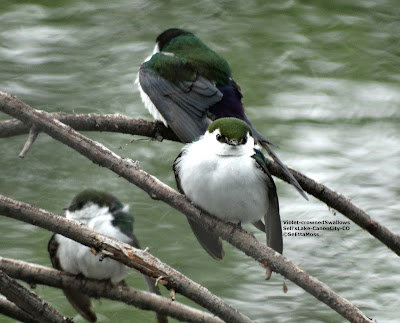Impact of hurricanes in gulf on habitat
As I noted in prior post, it is too early to know the impacts of Hurricane Gustav on bird and other wildlife habitats and populations. However, the Nature Conservancy website discusses hurricane impacts in general:
"Throughout its 40 year history of working along the Gulf Coast, the Conservancy has understood the connection between healthy natural systems and the well being of human communities. A major concern at this time of year are the impacts on songbird migration that is in effect now. Though many birds will hunker down or seek shelter like the pelicans in the previous post, the larger problem is the impact on the habitat they rely on for stop-overs before launching across the gulf of Mexico and especially the food available to shore them up for their long journeys.
While damage from the hurricanes would have been significant in any case, that damage was intensified by the historic loss of coastal wetlands, barrier islands, and oyster reefs. In Louisiana alone, more than 25 square miles of coastal wetlands are lost every year. By incorporating coastal conservation into reconstruction efforts along the Gulf Coast, we are rebuilding our best defense against future storms."
"South Louisiana houses the single largest port complex in the world. And a booming tourism industry is dependent upon visitors who come to the coast to see some of the nation’s most beautiful natural areas as well as hundreds of millions of migratory birds – representing more than 260 species – that stop along the Gulf Coast during their flights from North to South America. Today, the vast majority of that bird habitat is destroyed."
(from http://www.nature.org/pressroom/news/news1789.html) SeEtta
"Throughout its 40 year history of working along the Gulf Coast, the Conservancy has understood the connection between healthy natural systems and the well being of human communities. A major concern at this time of year are the impacts on songbird migration that is in effect now. Though many birds will hunker down or seek shelter like the pelicans in the previous post, the larger problem is the impact on the habitat they rely on for stop-overs before launching across the gulf of Mexico and especially the food available to shore them up for their long journeys.
While damage from the hurricanes would have been significant in any case, that damage was intensified by the historic loss of coastal wetlands, barrier islands, and oyster reefs. In Louisiana alone, more than 25 square miles of coastal wetlands are lost every year. By incorporating coastal conservation into reconstruction efforts along the Gulf Coast, we are rebuilding our best defense against future storms."
"South Louisiana houses the single largest port complex in the world. And a booming tourism industry is dependent upon visitors who come to the coast to see some of the nation’s most beautiful natural areas as well as hundreds of millions of migratory birds – representing more than 260 species – that stop along the Gulf Coast during their flights from North to South America. Today, the vast majority of that bird habitat is destroyed."
(from http://www.nature.org/pressroom/news/news1789.html) SeEtta


Comments